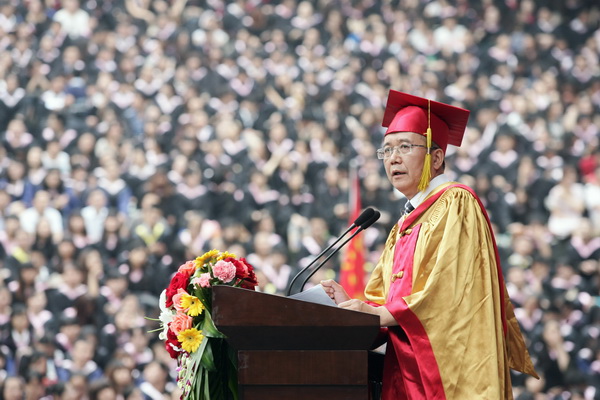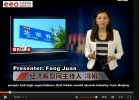


By Liu Jinsong (刘金松) and Peng You (彭友)
Issue 626, July 1, 2013
Nation, page 9-10
Translated by Tian Shaohui
Original article: [Chinese]
Last week Lin Jianhua (林建华) was appointed president of Zhejiang University, one of China's most prestigious universities. For Lin, the move from his position as president of Chongqing University (重庆大学) to a similar post at Zhejiang University (浙江大学), was supposed to be just another routine personnel shift.
However, before the appointment was even officially announced, alumni groups from around the world had jointly published a statement outlining their hopes and expectations for a new school president. It was obvious that Professor Lin did not meet the qualifications as outlined in their joint statement.
Not long after that, a more direct attack on Lin's appointment was launched - an open letter opposing his appointment as the new president on the grounds that although he might be a good administrator, his academic achievements did not stack up against those of many former university presidents.
By the end of June, the "routine appointment" was now a widely-reported controversy and has become the focus of a broader public debate about university appointments.
A Disputed Appointment
The post of president of Zhejiang University was vacated in March 2013 when former president Yang Wei (杨卫) was appointed director of the National Natural Science Foundation of China (国家自然科学基金委员会).
The absence of a university president caused some minor inconveniences for the university, which is oftern ranked as China's "No. 3" university, after Peking and Tsinghua University. Normally it's the university president that signs the diplomas of graduating students, so when it came to awarding degrees in the Spring od 2013 and no-one had been appointed to replace Yang Wei, the job instead fell to another senior party official at the university.
By the end of May, news was spreading that Lin, the then president of Chongqing University and a former vice president of Peking University, would be appointed to the position by the Organization Department of the Communist Party of China and the Ministry of Education. It was at this point that oppositon began to emerge.
One of those contributing to the debate was Wang Xiaojie (王晓杰), the head of the French chapter of Zhejiang University's Alumni Association. Wang told the EO how he discussed the appointment with other former classmates via a QQ group for alumni of the university.
Although Wang acknowledged Lin's achievememts, working his way up from vice president of Peking University and then president of Chongqing University, he still holds that Lin is not the best person for the job.
On June 21, Wang posted an article to his personal blog that argued that the students, teachers and alumni of Zhejiang University should be able to have a say in who is appointed university president. This post formed the basis of what later became a joint statement signed by the heads of alumni chapters both in China and around the world.
The statement appealed to the authorities to select a proper person to take the presidency, specifying that the candidate should have a high academic ranking (学术地位高), be in the prime of their life (年富力强的人士) and have a strong influence on society (社会影响力大).
When all of this was blowing up online, Lin Jianhua was busy taking photos with graduating students at Chonqing University. When approached for a comment about both the online statement and letter, Lin chose not to respond.
Lin Jianhua's Qualifications
Lin was born in October 1955 in Gaomi, Shandong Province, which is also the home town of Nobel prize winning author Mo Yan.
He received his B.S. in chemistry in 1982 and his PhD in chemistry in 1986 both from the Chemistry Department of Peking University and took up a research position with the same university in 1986.
From 1988 to 1993, he conducted post-doctoral research in Germany and the US. In 1993 Lin returned to teach at Peking University as an associate professor and was promoted to full professorship in 1995. From 1998 to 2002, he served as Dean of the College of Chemistry of Peking University. From 2004 to 2010, he served as Executive Vice President and Provost of Peking University.
From October 2010 Lin served as president of Chongqing University.
Not the First Candidate
Lin Jianhua was not the first candidate for the position to stir controversy.
Before the appointment of Lin, there were rumors that Song Yonghua (宋永华), one of Zhejiang University's vice-presidents, was being considered as a possible replacement for Yang Wei.
The young professor did not have close ties to Zhejiang University but he had a solid reputation both domestically and abroad.
A professor at the university who was unwilling to be named told the EO that quite a few teachers came together to oppose Song's appointment, with one of the main reasons for their opposition being his British nationality.
The head of a department at the university told the EO that he's never met Lin Jianhua and the issue is not really about whether he supports or opposes the appointment of Lin but that there is a deeper point to this controversy which is opposed to the way these appointments are made by administrative order.
The academic said that this kind of administrative appointment mechanism obstructs the developing a world-class universities in China.
How Far are We from Electing University Presidents?
Liu Daoyu (刘道玉) is the former president of Wuhan University (武汉大学) and a famous academic in China. Liu thinks that the recent controversy over the appointment of a new president of Zhejiang University is a sign that academics are starting to wake up. Liu told the EO how in the past some professors had complained that academics have it worst than farmers under the current system, noting that at least farmers have the right to elect village heads.
Liu also noted that the current method for selecting university presidents seems to have taken a big step backwards compared to the system that was in use in the eighties.
At that time, the Ministry of Education would team up with the local Organization Department and carry out opinion polls among academics ranked higher than vice-professor. After a straw poll of senior academics was completed, the next administrative level above would need to make the appoitment. Now university leaders are simply parachuted in from on high (空降校长).
Wang Xiaojie explained that "Professors and students have no idea today who will be appointed as head of the university tomorrow, if this were to happen in France it would be a joke."
Rather than opening up the position of university president to an open election, Wang favors an approach in which the position is first advertised publicly and then a competitive screening of candidates is undertaken by a body formed by the university in collaboration with central authorities. Alumni would also be invited to take part in the process.
"When selecting a university president, we pay more attention to the views of the 'owners,' namely teachers, students and alumni. Additionally, this process should be more open, transparent and systematic," said Wang.
Stalled Reforms
There have already been moves to reform the methods by which university leaders are selected in China. According to the aims outlined in a recent 10-year plan for reforming education in China, there are going to be changes to the way government manages higher education. The practice of ranking school officials according to the same system that applies to government officials will be done away with and the method of appointing school presidents will be improved.
In 2011, the Ministry of Education launched a reform of the method for selecting university presidents and currently five universities, including Beijing Normal University (北京师范大学) are piloting the new system.
Gu Yeli (顾也力), the deputy president of the Guangdong University of Foreign Studies, told the EO that while the pilot reforms were a step in the right direction, "the form of the election still needs to be improved, the idenities of who gets to elect the committee needs to be made public and we need to know what proportion of the vote is accounted for by professors.
"Only five percent of '211' universities (a special program initiated by CPC central committee and State Council to nurture 100 world-class universities for the 21st century) are particiapting in the trial", said Xiong Bingqi (熊丙奇), vice president of 21st Century Education Research Institute. "Not one of these universities applies the new selection method to positions above that of deputy president and at the vast majority of universities, presidents are still appointed to the traditional administrative method.
"Over the past few years there has been a lot of talk about pilots and breakthroughs, but in reality none of it has really touched the underlying problem of the "administratification" (行政化) of tertiary education. No success will achieved for educational reform, as long as the presidents are appointed through administrative channels, " added Xiong Bingqi. "If university presidents are appointed in this way, then they will be officials rather than educators."
EO Journalist Du Yuan (杜远) and interns Ye Mengdie (叶梦蝶), Kang Xiao (康潇) and Zhang Yan (张燕) also contributed to this report
Links and Sources
Zhejiang University: LIN Jianhua Profile Page
Ministry of Education: 林建华任浙江大学校长
Shanghai Daily: Selection of university head draws criticism
Shenzhen Daily: Alumni oppose candidate to lead university
Global Times: Zhejiang U. showdown
Phoenix: Text of the public statement urging authorities not to appoint Lin Jianhua (Chinese)

